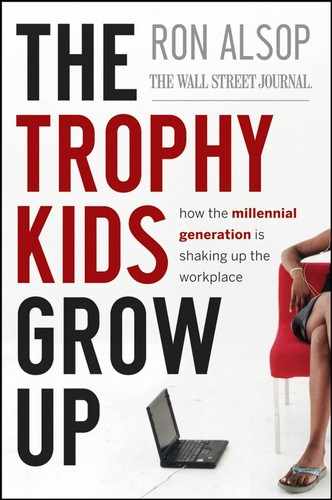8.4. EXPRESS YOURSELF
In their quest for workplace balance, millennials also seek freedom to express themselves personally. They want more than casual Fridays. They want casual everyday.
But millennials are clashing with some tradition-bound companies over their wardrobes, tattoos, body piercings, and rainbow-hued hair. Some managers cringe when they see young employees sashay into the office wearing torn jeans and flip-flops and sporting tattoos on their arms and piercings on their face. One young woman at an investment bank told me she'd be willing to pay $20 a day for the chance to wear jeans to work. But so far, no one has taken her up on her offer.
Some employers may have no choice but to become more tolerant. According to a survey by the Pew Research Center in Washington, DC, 36% of 18- to 25-year-olds have a tattoo, 25% have dyed their hair an untraditional color, and 30% have a piercing somewhere other than their earlobe. Tattoos are so popular these days that even the U.S. Army relaxed its policies to avoid losing qualified recruits. Tattoos now are permitted on the hands and back of the neck, assuming they aren't "extremist, indecent, sexist, or racist." But the Army stresses that tattoos still are forbidden on soldiers' heads and faces.
As for apparel, millennials should enjoy some degree of freedom. Hewitt Associates, the human resources consulting firm, found that 58% of employers allow casual dress on a regular basis; 10% go casual only on Fridays. But "casual" is in the eye of the beholder. Johnson & Johnson defines casual as chinos and polo shirts, for example, whereas T-shirts and shorts would be the casual look at some technology companies. KPMG, which permits business casual dress that isn't sloppy, is letting millennials know just how far they can go in expressing their sartorial individuality. In the accounting firm's recruiting magazine for college students, KPMG details what's appropriate and what isn't. Some tips: "If it's too tight, it ain't right," "The bling? Not something to bring to the office," and for casual Friday jeans, "no holes, tears, sequins, embroidery, appliqués, or fringe." The bottom line at KPMG: "It's always better to be overdressed than underdressed."
For a financial services company, Capital One is unusually accommodating when it comes to office wardrobe. Ties are required for meetings with customers and vendors, but otherwise it's a personal choice. In some offices, especially in warmer climates, it isn't unusual to see employees clad in shorts and T-shirts. "We don't spend our time fussing over it," says Matthew Schuyler, the human resources chief. "You should be comfortable at work, but you have to do it within reasonable boundaries or you'll be challenged by your fellow employees. Our philosophy is that we hire intelligent people who can decide if wearing blue jeans every day is okay."
Gretchen Neels, a Boston-based consultant, believes that companies must understand that millennials' flip-flops and jeans are an integral part of their identity. "They're all caught up in how they project themselves to the world," she says. To avoid workplace warfare, she advises employers to spell out wardrobe and appearance standards very clearly and then stand their ground. "No spandex, no yoga clothing, shoes must be worn in the office, and by the way, socks are not considered shoes," she suggests managers tell their millennial hires. "Also, be sure to explain the why. Tell them that clients not only want to know you're worth the rates they are paying; they want you to look like you're worth it, as well."
That's the attitude of Alison Brod. As president and founder of a public relations and marketing agency in New York City, Brod enforces a rule that jeans are forbidden at client meetings. When her millennial employees protest that client representatives sometime wear jeans themselves, she replies, "That is fine, but they pay for an image when they pay for a PR agency." For client meetings, she also must remind them to apply some makeup and ditch the chewing gum. "Many of these women believe that comfort trumps all," she says. "They are an attractive group and feel that they look great in jeans without makeup, but don't realize that looking hot doesn't mean it looks professional."
Workplace attire clearly remains a contentious issue, judging from the spirited feedback to a Wall Street Journal article about young people dressing down at law firms in jeans and Ugg boots. "If the job is done with precision, then who cares? A moron in a suit is still a moron," a supporter of casual dress commented on the newspaper's Law Blog. Another reader offered this suggestion: "Hey, partners, let us work from home and you won't have to worry about seeing us in cotton pants, golf shirts, or Uggs."
Opposing counsel offered these comments:
"If big law firms didn't treat Harvard and other top law school grads like they were gods, they probably wouldn't be so narcissistic and feel so entitled to wear yoga outfits, Uggs, jeans, and khakis to work."
"Companies have a wide range of choice in firms these days, and they want counsel that looks and acts the part. Quirky and individualistic is fine, just not sloppy and too casual. Also, wash your hair, wear some makeup if you are a woman, and make sure your nails are clean."
